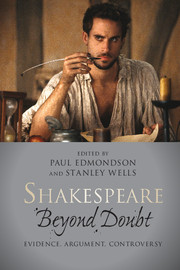Part III - A cultural phenomenon: Did Shakespeare write Shakespeare?
Published online by Cambridge University Press: 05 April 2013
Summary
A cultural phenomenon: Did Shakespeare write Shakespeare?
This third and final section considers the dynamic afterlife of the authorship discussion, since it originated more than a century and a half ago with the writings of Delia Bacon. Kathleen E. McLuskie (Chapter 14) discusses how and why anti-Shakespearian stories are told, their political, cultural and psychological dynamics. The kinds of evidence that the doubters summon into play need always to be carefully contextualized. Andrew Murphy (Chapter 15) gives a fascinating account of Delia Bacon's influence (almost half a century after her death) on Hester Dowden (daughter of the famous Shakespeare scholar Edward Dowden). Murphy provides one illuminating example of how and why anti-Shakespearianism can take a powerful hold on an intelligent person's intellect. Paul Franssen then identifies narrative tropes in fictional accounts of the authorship discussion, and shows how they have a propensity to re-invent as well as repeat themselves (Chapter 16). Stuart Hampton-Reeves (Chapter 17) presents a critical investigation into the anti-Shakespearians’ online ‘Declaration of Reasonable Doubt’, its methodology and adherents. Douglas Lanier (Chapter 18) discusses the narrative, cultural and historical energies of Roland Emmerich's 2011 film Anonymous and lays out how it works towards (and in hindsight missed) its anti-Shakespearian goal. Although the film was a box office disaster it remains a fascinating document in the on-going history of anti-Shakespearianism. This final part of our book concludes with Paul Edmondson's consideration (Chapter 19) of the different kinds of antagonism which clash at the heart of the Shakespeare authorship discussion and its infiltration into at least two universities. His account is illustrated by close reference to The Shakespeare Birthplace Trust's Shakespeare Authorship Campaign.
- Type
- Chapter
- Information
- Shakespeare beyond DoubtEvidence, Argument, Controversy, pp. 161 - 162Publisher: Cambridge University PressPrint publication year: 2013



